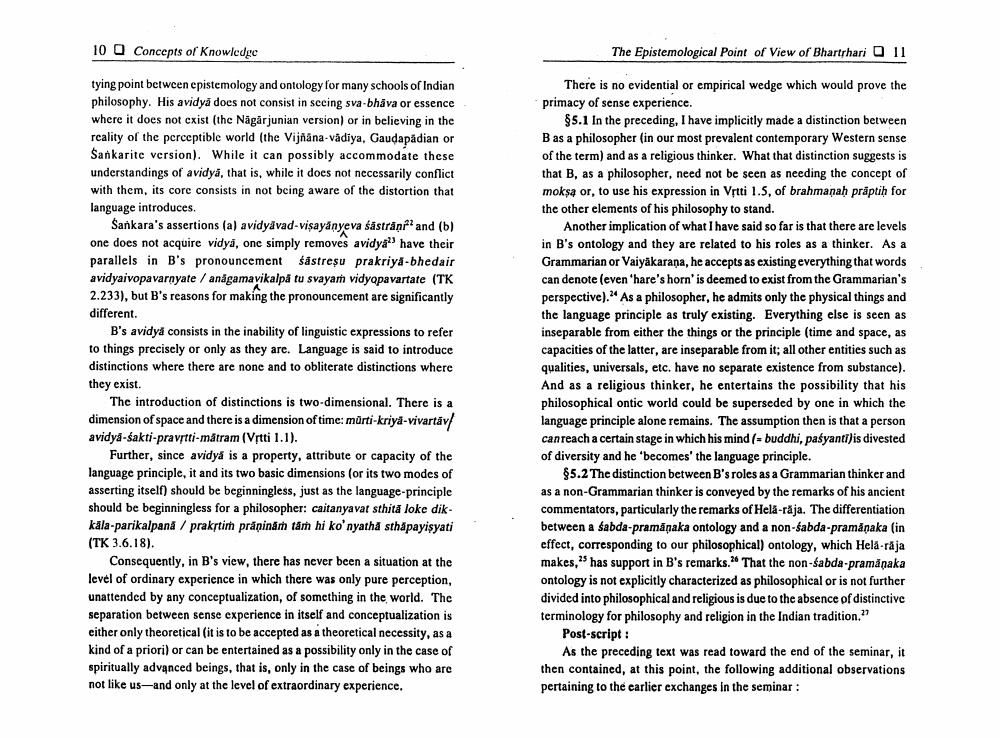Book Title: Epistemological Point Of View Of Bhartrhari Author(s): Ashok Aklujkar Publisher: Ashok Aklujkar View full book textPage 6
________________ 10 O Concepts of Knowledge The Epistemological Point of View of Bhartrhari O 11 tying point between epistemology and ontology for many schools of Indian philosophy. His avidya does not consist in sccing sva-bhava or essence where it does not exist (the Nāgarjunian version) or in believing in the reality of the perceptible world (the Vijñana-vadiya, Gaudapādian or Sankarite version). While it can possibly accommodate these understandings of avidya, that is, while it does not necessarily conflict with them, its core consists in not being aware of the distortion that language introduces Sankara's assertions (a) avidyāvad-visayanyeva sastrani and (b) one does not acquire vidya, one simply removes avidya' have their parallels in B's pronouncement śåstresu prakriya-bhedair avidyaivopavarnyate / anagamavikalpă tu svayam vidyopavartate (TK 2.233), but B's reasons for making the pronouncement are significantly different B's avidyd consists in the inability of linguistic expressions to refer to things precisely or only as they are. Language is said to introduce distinctions where there are none and to obliterate distinctions where they exist. The introduction of distinctions is two-dimensional. There is a dimension of space and there is a dimension of time: murti-kriya-vivartáv/ avidya-sakti-pravstti-matram (Vitti 1.1). Further, since avidya is a property, attribute or capacity of the language principle, it and its two basic dimensions (or its two modes of asserting itself) should be beginningless, just as the language-principle should be beginningless for a philosopher: caitanyavat sthita loke dik kala-parikalpaná / prakrtim prāpinām tam hi ko'nyatha sthapayisyati (TK 3.6.18). Consequently, in B's view, there has never been a situation at the level of ordinary experience in which there was only pure perception, unattended by any conceptualization, of something in the world. The separation between sense experience in itself and conceptualization is either only theoretical (it is to be accepted as a theoretical necessity, as a kind of a priori) or can be entertained as a possibility only in the case of spiritually advanced beings, that is, only in the case of beings who are not like us-and only at the level of extraordinary experience. There is no evidential or empirical wedge which would prove the primacy of sense experience. $5.1 In the preceding, I have implicitly made a distinction between B as a philosopher (in our most prevalent contemporary Western sense of the term) and as a religious thinker. What that distinction suggests is that B, as a philosopher, need not be seen as needing the concept of moksa or, to use his expression in Vrtti 1.5, of brahmanah präptih for the other elements of his philosophy to stand. Another implication of what I have said so far is that there are levels in B's ontology and they are related to his roles as a thinker. As a Grammarian or Vaiyakarana, he accepts as existing everything that words can denote (even 'hare's horn' is deemed to exist from the Grammarian's perspective). As a philosopher, he admits only the physical things and the language principle as truly existing. Everything else is seen as inseparable from either the things or the principle (time and space, as capacities of the latter, are inseparable from it; all other entities such as qualities, universals, etc. have no separate existence from substance). And as a religious thinker, he entertains the possibility that his philosophical ontic world could be superseded by one in which the language principle alone remains. The assumption then is that a person canreach a certain stage in which his mind (= buddhi, paśyanti)is divested of diversity and he becomes' the language principle. $5.2 The distinction between B's roles as a Grammarian thinker and as a non-Grammarian thinker is conveyed by the remarks of his ancient commentators, particularly the remarks of Helă-răja. The differentiation between a $abda-pramāņaka ontology and a non-éabda-pramanaka (in effect, corresponding to our philosophical) ontology, which Hela-raja makes," has support in B's remarks. That the non-sabda-pramanaka ontology is not explicitly characterized as philosophical or is not further divided into philosophical and religious is due to the absence of distinctive terminology for philosophy and religion in the Indian tradition." Post-script: As the preceding text was read toward the end of the seminar, it then contained, at this point, the following additional observations pertaining to the carlier exchanges in the seminar:Page Navigation
1 ... 4 5 6 7 8 9 10
